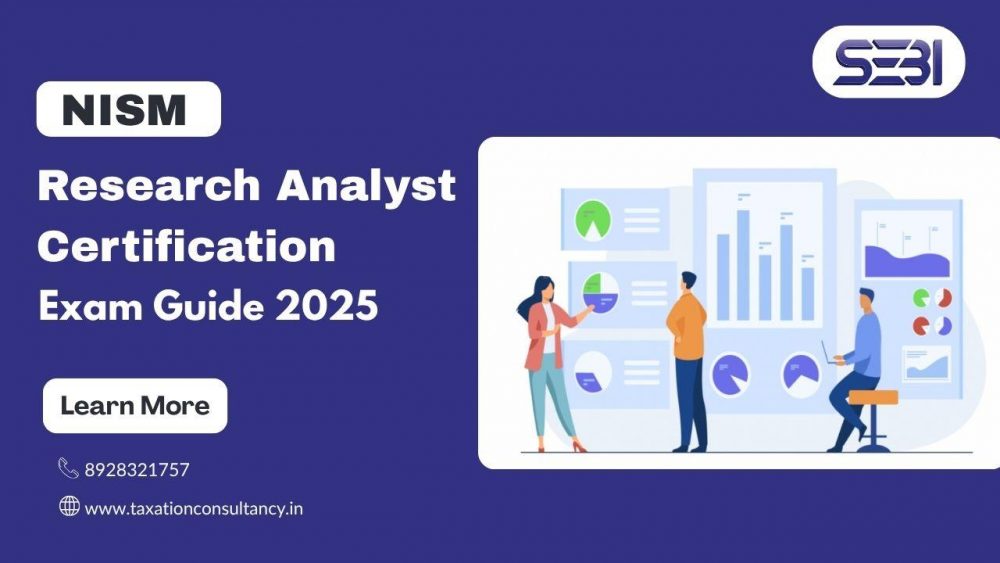Choosing the route to How to become a SEBI Registered Research Analyst Guide 2025 (RA) presents a very worthwhile professional journey for those keen on equity markets, stock evaluation, or offering financial guidance. Yet, with SEBI’s tight rules, necessary tests, and documentation needs, the venture can quickly look overwhelming—much like navigating a maze without a guide.
This guide presents a simple, step-by-step tour to grasp obtaining SEBI certification as a research analyst, outlining the relevant SEBI research analyst regulations, and providing strategies for passing the required proficiency exam. Afterwards, you will possess a clear comprehension of the required actions, implementation methods, and plans to distinguish yourself in this competitive area.
Introduction to SEBI Research Analyst Role
A SEBI Registered Research Analyst is an individual permitted to offer objective, evidence-based, and analytical investment insights to the general populace. SEBI, which is India’s financial oversight body, guarantees that analysts adhere to clear, principled standards to safeguard investors. If you’ve ever considered assisting others in making more astute investment decisions, this presents an opportunity.
What is the Role of a SEBI Registered Research Analyst?
A market analyst carries out industry study, examines fiscal documents, assesses equities, compiles documents, and provides investment perspectives supported by evidence. Imagine a research analyst is akin to a beacon steering investors securely across the turbulent seas of the stock exchange.
Main Duties
- Equity and financial analysis
- Preparing investment research reports
- Sector and company analysis
- Data modelling and valuation
- Offering supportable suggestions
Why Choose to Become a SEBI Registered Research Analyst?
Here are compelling grounds for seeking this profession:
- Legal authority to publish investment recommendations
- Opportunities to work for broking firms, AMCs, fintech companies, PMS firms
- Ability to offer paid stock market advice as an individual
- High credibility and trust among investors
- Growing demand for qualified analysts in India
Eligibility Requirements to Become a Research Analyst
SEBI has clearly defined eligibility standards. You need:
- A relevant educational background
- Specific experience (if applicable)
- Certification from NISM
- Compliance with SEBI Research Analyst Regulations
Let’s go deeper into what SEBI expects.
SEBI Research Analyst Rules (General View)
The SEBI Research Analyst Regulations, 2014 set forth standards for analysts to encourage openness and safeguard investors.
Main Rules Encompass:
- Mandatory NISM certification
- Clear revelation of potential clashes of interest
- No misleading or guaranteed returns
- Keeping up with study documents and information files
- Adhering to promotional rules
- Ensuring independence in analysis
These regulations form the backbone of ethical research and protect the integrity of financial markets.
How to Clear the SEBI Registered Research Analyst Exam
The NISM Series-XV: Research Analyst Certification assessment is compulsory.
Exam Format
- 100 marks
- 100 questions
- MCQ format
- No negative marking
- The lowest acceptable score is sixty percent.
Instructions for Readiness
- Study NISM’s official workbook
- Practice mock tests
- Grasp accounting reports
- Examine asset valuation techniques, such as Discounted Future Earnings, Price-to-Earnings ratio, Price-to-Book value, and comparable procedures.
- Review ethics and SEBI rules comprehensively
After successfully completing the test, the certification remains effective for a period of three years.
A Step-by-Step Look at Enrolling with SEBI
Here is a simple, sequential process for obtaining SEBI registration as a research analyst:
Step 1:Finish the NISM Research Analyst Qualification
Taking the NISM Series XV test is necessary.
Step 2: Gather All Required Documents
This covers scholarly proof, work background, qualifications, separate papers, and related items.
Step 3: Apply on the SEBI Intermediary Portal
Visit SEBI’s SI portal and create an account.
Step 4: Submit the Enrollment Charge
Submit the required payment online.
Step 5: SEBI Verification
SEBI may ask for clarifications, so keep all documents handy.
Step 6: Obtain Registration Number
Once approved, you’ll receive a unique SEBI Research Analyst Registration Number, allowing you to publish research legally.
Documents Required for SEBI RA Registration
You will need:
- PAN card
- Aadhaar card
- Educational certificates
- NISM RA exam certificate
- Experience letters (if required)
- Income tax returns (optional)
- Address proof
- Passport-size photo
- Cover letter and declaration
SEBI may request additional documents during verification.
Educational Qualifications & Experience Criteria
To register, SEBI requires:
Minimum Qualification
You need to possess at least one of these:
- A graduate-level qualification in Finance, Accounting, Commerce, Business Administration, Economics, or Capital Markets
- A professional qualification such as CA, CFA, CS, ICWA
- A graduate degree + 5 years of financial market experience
If you do not meet these criteria fully, don’t worry—SEBI also accepts equivalent coursework or certifications in some cases.
Fee Structure for SEBI RA Registration
Here’s a clear breakdown:
| Fee Type | Amount |
| Registration Fee | ₹5,000 (approx) |
| Application Processing Fee | Around ten thousand rupees |
| Upkeep Fee (every five years) | ₹5,000 |
Always check for updated fee structure on SEBI’s official website.
Roles & Responsibilities of a Registered Analyst
Once registered, you are expected to:
- Publish unbiased research
- Disclose conflicts in reports
- Maintain data and research logs
- Avoid guaranteed return claims
- Follow advertising and communication rules
- Provide transparent and evidence-backed recommendations
This builds trust and ensures compliance.
Skills You Need to Become a Successful RA
To thrive in this domain, you require:
Proficiency in Techniques
- Financial outlining
- Valuation techniques
- Ratio analysis
- Excel & data analytics
- Industry research
Soft Skills
- Analytical thought
- Communication
- Careful consideration
- Moral choice formulation
Consider technical abilities the motor of an automobile and interpersonal proficiencies the directional control—both are essential for secure and efficient progress.
Job Prospects Following SEBI Registration
Your options expand dramatically after registration:
- Equity Research Analyst at brokerage firms
- Research departments of investment banks
- Asset Oversight Offerings
- Financial Guidance Companies
- Fintech platforms
- Independent research service provider
- Freelance analyst giving paid recommendations
As the pool of individual investors in India expands, the need for superior analysis has reached record levels.
Frequent Pitfalls to Sidestep When Enrolling
Steer clear of these errors:
- Incomplete documentation
- Not disclosing conflicts of interest
- Providing misleading investment claims
- Publishing research before receiving SEBI RA number
- Errors in the SEBI application portal
Being careful here can save weeks of delays.
Conclusion
Becoming a SEBI Registered Research Analyst Exam is one of the best ways to build a credible and successful career in financial markets. For those aiming to join a leading company or launch their personal research consultancy, SEBI registration bestows credential, credibility, and standing.
Possessing suitable credentials, NISM accreditation, and a planned submission routine, you are able to evolve into a valued analyst guiding investors toward well-founded choices.
FAQs
1. What is the exam for a SEBI Registered Research Analyst?
The NISM Series XV: Research Analyst Certification exam is necessary for SEBI registration qualification.
2. How long does SEBI RA registration take?
The time frame usually spans four to eight weeks, contingent upon document confirmation.
3. Can I work independently after becoming a SEBI RA?
Yes. SEBI allows you to operate as an individual research analyst and offer paid recommendations.
4. Is experience mandatory to register as a research analyst?
Not always. If you have a postgraduate finance degree, you may not need prior experience.
5. Can a research analyst give stock tips?
Analysts can give research-backed recommendations, but cannot guarantee returns or engage in misleading practices.



